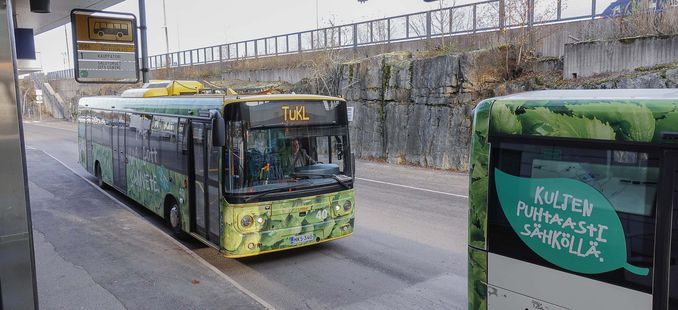
eBussed promotes the e-bus deployment in Turku and Europe
The Interreg Europe project, coordinated by Turku University of Applied Sciences, supports the City of Turku’s Climate Plan 2029.
Text: Siiri Welling
Photo: Jassi Aho
On the European scale, the City of Turku is doing fine in the electrification of its bus fleet, says Aleksi Heinonen, the eBussed project manager at Turku University of Applied Sciences. The international eBussed project aims to improve the participating regions’ readiness level to adopt new electric bus systems and to expand and develop existing systems, despite their different profiles.
– During the first phase of the project, we have exchanged experiences with five other partner countries. The original intention was to carry out study visits to these partner countries, but the pandemic changed the plans for a few years, says Heinonen.
The project's meetings and events have taken place online. According to Heinonen, the electrification rate of Turku's public transport is quite good compared to the other countries participating in the project.
– Currently, about a quarter of the bus fleet in Turku's is already running on electricity. However, it did not require additional funding but has been achieved on market terms. When the project was planned, three of the selected partners’ countries already had e-buses and three of them were planning to acquire them. So, in that sense, Turku is in the same league as Utrecht and Hamburg and is well on track in both the Finnish and in the European scale, says Heinonen.
To describe some of the Good Practices identified in Turku, the project produced videos. The video below describes the benefits of having a public operator as a testing and monitoring platform.
Public transport is organised in very different ways throughout European cities. The differences can be considerable, even between neighbouring cities. In Hamburg, for example, there are two large operators, both owned by the city. They plan the transport, acquire the buses, and operate them. In Turku, on the other hand, the Turku region public transport operator Föli has no buses of its own. The lines’ operators are selected through a competitive tender process.
– However, this has not slowed down the e-bus deployment in Turku. At the moment, it seems that the number of e-buses increases every time a tender for a bus route is being organized.
Expert groups involved
The main idea behind the project is to learn from others and replicate good practices for the own region’s use. One good practice that Turku University of Applied Sciences has been particularly interested in has been implemented in Hamburg.
– The bus operator has a systematic approach to electrification of the city of Hamburg. They developed a detailed roadmap consisting of seventeen work packages, which describe, area by area, the aspects that need to be considered to achieve the targets," says Heinonen.
The project has had four expert groups working on e-bus-related issues. The first group focused solely on the drivers and barriers of e-bus deployment, while the second group discussed the technical requirements for electrification. In the spotlight were, for example, charging systems’ fire-safety issues. In addition, the third expert group has identified regional special characteristics and regionally important public transport issues, as well as procurement and business models for electric buses. The fourth group focused on the users: passengers, drivers, and maintenance staff.
– Markku Ikonen, an expert on the automotive sector at Turku UAS, led the working group. The group conducted a broader survey of the user groups’ experiences and attitudes. The results were positive, says Heinonen.
Another Good Practice video describes the training model carried out in Turku. Instead of focusing on the e-bus drivers only, all staff were trained to ensure smooth and safe operation.
The City of Turku has not been a partner in the eBussed project but has been closely involved, as Föli and Turun Kaupunkiliikenne are key target groups in the project.
During the spring, the action plans for each region will be finalised. The aim is to create concrete guidelines and practices to increase the number of e-buses in Turku. The report will support the City of Turku's Climate Plan that pursues for carbon neutrality by 2029.
– The plan will help us to support the City of Turku in achieving its climate targets," says Heinonen.
The eBussed project, which involves Turku University of Applied Sciences' New Energy research group , will end in the summer of next year.
